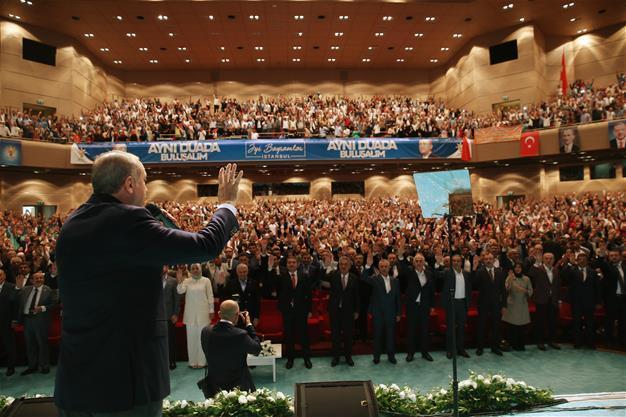‘Humankind is insensitive’ to Myanmar violence: Erdoğan
ISTANBUL – Anadolu Agency
 Humanity is being “insensitive” to the ongoing violence against Rohingya Muslims in the southeastern Asian country of Myanmar, Turkey’s president said on Sept. 1.
Humanity is being “insensitive” to the ongoing violence against Rohingya Muslims in the southeastern Asian country of Myanmar, Turkey’s president said on Sept. 1. Speaking to reporters in Istanbul on the first day of the Eid al-Adha Muslim holiday, Recep Tayyip Erdoğan stated that hundreds of Rohingya Muslims in Rakhine state, Myanmar have been killed, their villages burned, and 20,000 stranded people have been crossing into Bangladesh, leaving their homes behind.
“All of this is happening before humanity’s very eyes, but unfortunately humanity is insensitive to it,” he said.
Eid al-Adha, known as the feast of the sacrifice, recognizes Abraham’s submission to God in his willingness to sacrifice his son.
“As the rotating president of the Organization of Islamic Cooperation, I held necessary talks with leaders of Islamic countries and UN Secretary-General (Antonio) Guterres” about the Rohingya crisis, said Erdoğan.
He said that Muslim world is saddened to mark Eid al-Adha amid the violence in Myanmar, conflicts in Syria and Iraq, and the fight against terrorism in Turkey.
Speaking at an Eid celebration of the ruling Justice and Development (AK) Party in Istanbul later in the day, Erdogan urged the Muslim world to take a common stand against the violence in Myanmar.
“We are well aware that the problem of Arakan [Rakhine] is a manifestation of global power struggles,” he said.
“None of the forces that want to mislead the state of Myanmar due to the strategic importance of the region have taken any deterring action to stop this crime of humanity,” Erdoğan said, adding that Turkey is trying to bring its sensitivity to the issue.
“We are trying to mobilize international mechanisms, we are carrying out humanitarian aid activities in the region,” Erdogan said adding that the Turkish Red Crescent and the Disaster and Emergency Management Authority (AFAD) will continue providing humanitarian aid to Rohingya Muslims.
“But often the results of our efforts fall short because the Islamic world does not react as a whole to these massacres,” he stressed.
Erdoğan said that the “terrorist stamp” had become a “tool of abuse” that legitimizes all massacres, oppression, and persecution of Muslims.
The way the Rohingya are encouraged to turn to radical terrorist groups should be considered, he said.
Erdoğan stressed that Islamic civilization is trying to eradicate groups such as ISIL and Boko Haram, groups “brokered, organized, armed, guided, and whose fronts are led by indeterminate powers.”
In Rohingya “there are efforts to do the same,” he said, adding that he hopes the “bloody game” there will fail.
World silence on Myanmar violence is ‘picture of shame’
The international community has the responsibility to formulate a long-term solution to the Rohingya crisis in Myanmar’s western state of Rakhine, Turkish presidential spokesman Ibrahim Kalın said on Sept. 1.
“Turkey will continue to maintain its constructive and determined attitude for a solution,” Kalın said in a Twitter post.
He called “the world’s silence” in the face of the persecution of Rohingya Muslims by security forces of the southeast Asian country “a portrait of shame.”
Turkey is continuing “our intensive efforts and initiatives at every level to end the humanitarian tragedy” in Rakhine, according to the president’s aide.
He noted that Turkish humanitarian aid agencies, including the Turkish Red Crescent, Disaster and Emergency Management Authority (AFAD), and Turkish Cooperation and Coordination Agency (TIKA), are involved in these efforts.
Violence erupted in Myanmar’s Rakhine state on Aug. 25 when the country’s security forces launched an operation against the Rohingya Muslim community. It triggered a fresh influx of refugees towards neighboring Bangladesh, though the country sealed off its border to the refugees.
Media reports said Myanmar security forces used disproportionate force, displacing thousands of Rohingya villagers and destroying their homes with mortars and machine guns.
The region has seen simmering tension between its Buddhist and Muslim populations since communal violence broke out in 2012.
A crackdown launched last October in Maungdaw, where Rohingya make up the majority, led to a UN report on human rights violations and crimes against humanity by security forces.
The UN documented mass gang rape, killings -- including infants and young children -- brutal beatings, and disappearances. Rohingya representatives have said that some 400 people have been slain during the crackdown.
















